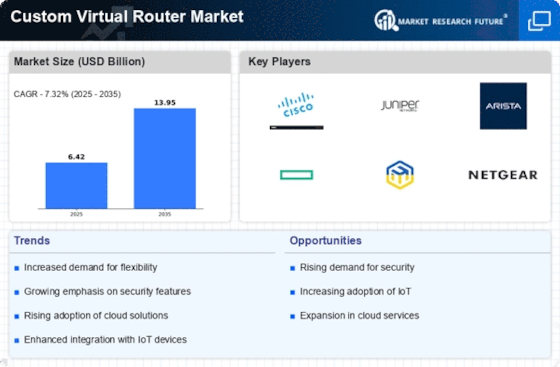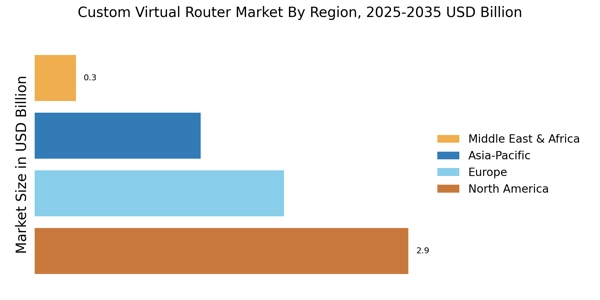Adoption of 5G Technology
The advent of 5G technology is reshaping the telecommunications landscape, thereby impacting the Custom Virtual Router Market. As 5G networks roll out, there is a growing need for advanced routing solutions that can handle increased data traffic and provide low-latency connectivity. Custom virtual routers are well-suited to meet these demands, offering the flexibility and performance required for 5G applications. Industry forecasts suggest that the 5G market will reach a valuation of over 700 billion dollars by 2026, creating substantial opportunities for the Custom Virtual Router Market. This technological evolution not only enhances network performance but also drives innovation in routing solutions, making them indispensable for service providers and enterprises alike.
Growth of Internet of Things (IoT)
The proliferation of Internet of Things (IoT) devices is significantly influencing the Custom Virtual Router Market. As more devices connect to networks, the need for efficient routing solutions becomes critical. Custom virtual routers facilitate the management of numerous IoT devices, ensuring seamless connectivity and data flow. Recent statistics indicate that the number of connected IoT devices is expected to exceed 30 billion by 2025, which underscores the necessity for robust routing solutions. This growth presents a substantial opportunity for the Custom Virtual Router Market, as businesses seek to implement scalable and efficient network architectures to support their IoT initiatives. The ability to manage diverse IoT traffic effectively positions custom virtual routers as essential components in modern network infrastructures.
Increased Focus on Network Security
In the current landscape, the Custom Virtual Router Market is witnessing an intensified focus on network security. With the rise in cyber threats and data breaches, organizations are prioritizing secure network solutions. Custom virtual routers offer advanced security features, such as encryption and traffic segmentation, which are essential for safeguarding sensitive data. Market analysis indicates that the demand for secure networking solutions is expected to grow significantly, with a projected increase of 30% in security-related investments by enterprises over the next few years. This heightened emphasis on security not only drives the adoption of custom virtual routers but also positions the Custom Virtual Router Market as a critical player in the broader cybersecurity landscape.
Rising Demand for Network Virtualization
The Custom Virtual Router Market is experiencing a notable surge in demand for network virtualization solutions. As organizations increasingly seek to optimize their network infrastructure, the shift towards virtualized environments becomes apparent. According to recent data, the market for network virtualization is projected to grow at a compound annual growth rate of approximately 25% over the next five years. This trend is driven by the need for flexibility, scalability, and cost efficiency in managing network resources. Virtual routers enable businesses to deploy and manage their networks more effectively, reducing hardware dependency and operational costs. Consequently, the Custom Virtual Router Market is poised to benefit from this growing inclination towards virtualization, as enterprises look to enhance their network capabilities while minimizing physical infrastructure investments.
Shift Towards Software-Defined Networking (SDN)
The transition towards Software-Defined Networking (SDN) is a pivotal trend impacting the Custom Virtual Router Market. SDN allows for centralized control of network resources, enabling more agile and efficient network management. Custom virtual routers play a crucial role in this paradigm shift, providing the necessary flexibility and programmability to adapt to changing network demands. Market Research Future indicates that the SDN market is projected to grow at a rate of 22% annually, reflecting the increasing adoption of software-driven networking solutions. This shift not only enhances operational efficiency but also drives innovation within the Custom Virtual Router Market, as organizations seek to leverage SDN capabilities to optimize their network performance and reduce costs.

















